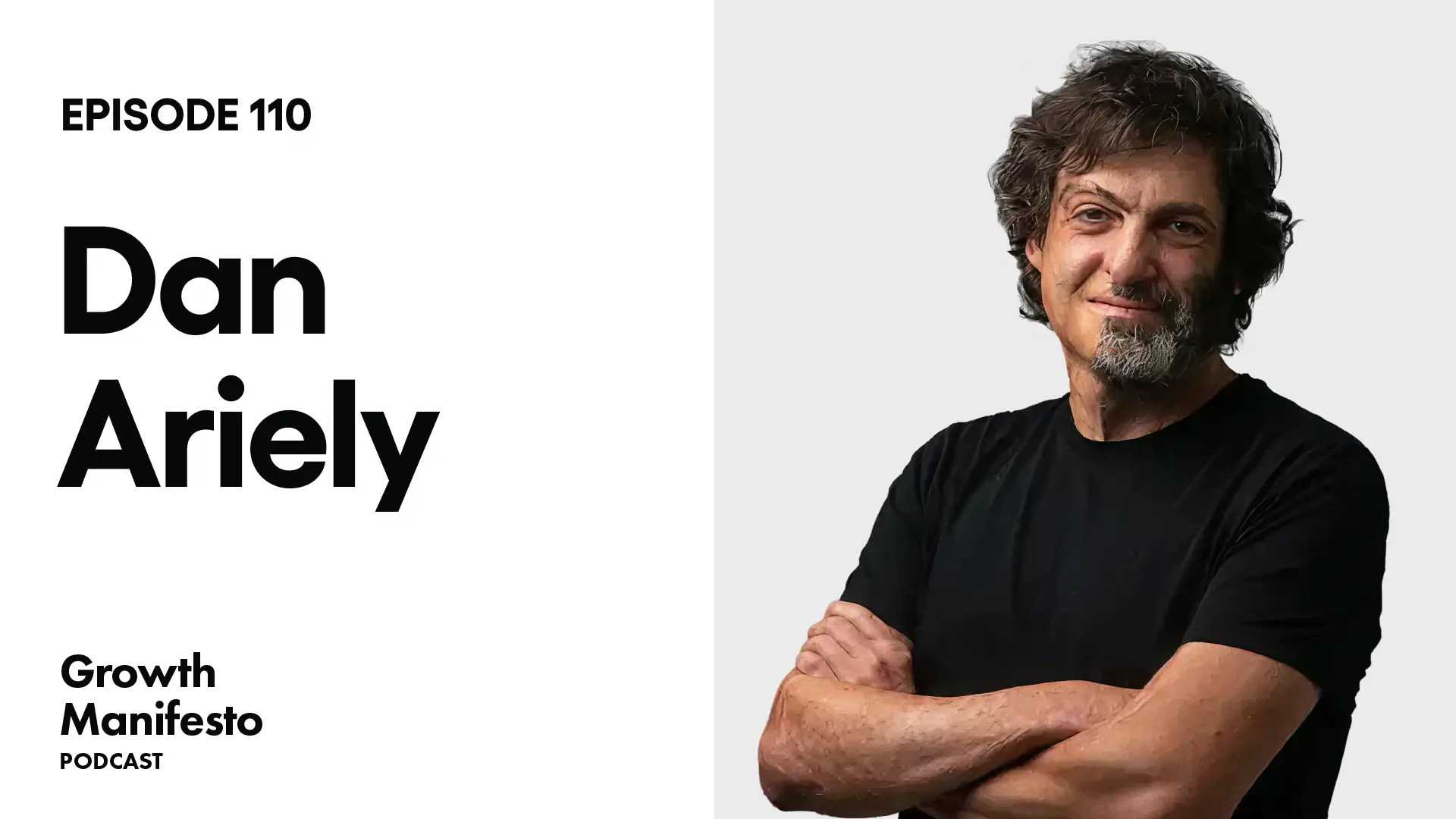The future of gaming, Web3 and the metaverse
This episode is with Aleksandr (‘Shurick’) Agapitov, the founder, CEO and man behind the multibillion-dollar gaming payment enterprise Xsolla which is used by Epic Games, Ubisoft, Twitch and hundreds more. We talk about the future of gaming, the metaverse, Facebook, Web3 and what changes we can expect to see in the next 5-8 years.
LINKS
—
You’re listening to The Growth Manifesto Podcast, a Zoom video series brought to you by Webprofits – a digital growth consultancy that helps global and national businesses attract, acquire, and retain customers through digital marketing.
Hosted by Alex Cleanthous.
- YouTube: https://www.youtube.com/c/GrowthManifestoPodcast
- Instagram: https://www.instagram.com/webprofits/
- LinkedIn: https://www.linkedin.com/company/web-profits/
- Facebook: https://www.facebook.com/Webprofits/
- Twitter: https://twitter.com/webprofits
- Agency: https://www.webprofits.io
SHOW NOTES
- 00:00:30 Aleksandr (Shurick) Agapitov introduction
- 00:01:30 About Xsolla
- 00:04:08 What Motivated Shurick to Open a Gaming Payment Facility?
- 00:05:43 Is Shurick a Developer?
- 00:08:55 The Biggest Changes in the Gaming Industry
- 00:15:41 The Growth of the Gaming Industry Through Mobile Games
- 00:18:35 How Esports Works
- 00:19:19 How the Gaming Industry will Change in the Next Few Years
- 00:21:28 The Definition of the Metaverse
- 00:24:07 Photorealistic 3D Gaming
- 00:25:34 How Do You Access the Metaverse?
- 00:30:05 Facebook and the Metaverse
- 00:36:55 Metaverse as an Open Platform
- 00:38:06 Biggest Apps in the Metaverse
- 00:45:05 How NFTs were Integrated Into The Metaverse.
- 00:48:16 The Challenge in NFTs
- 00:50:46 The Definition of Crypto Game
- 00:52:45 Xsolla’s Plan in the Future
- 00:55:38 Why is Web3 Upside Down?
- 00:58:14 The Best Way to Contact Shurick
TRANSCRIPT
Aleksandr Agapitov:
My personal view, you don’t go to Fortnite. You just go to the website, meta sites. You go to the Chrome, type the URL as you used to, and you can go full screen and boom, you’re there. It’s 3D photo realistic experience, and everybody would understand it. And I think that’s how it’s going to be.
Alex Cleanthous:
This is Alex Cleanthous. And today we’re talking with Aleksandr Agapitov, who’s also known as Shurick to his friends. So I’ll be calling him Shurick in this conversation. He’s the founder and CEO of the world’s leading payment company for gaming called Xsolla, which is used by the epic game store by a company called Twitch, which you may have heard of by Ubisoft and hundreds more.
Today, we’ll be talking about the gaming industry. We’re talking about NFTs and the conversation which everyone’s having today, which is around the metaverse. And just quickly before we get started, make sure to go ahead and hit that subscribe button so that you get the latest episodes as soon as they’re released. Now, let’s get into it. Welcome, Shurick.
Aleksandr Agapitov:
Thank you for having me.
Alex Cleanthous:
Yes. This is going to be a good conversation because I think the gaming industry is just expanding very quickly right now, this integration of NFTs. And there’s this whole other conversation of the metaverse, which for gamers probably is quite easy to understand, but for non-gamers, talking about the metaverse is confusing at the very least. Let’s get straight into it and let’s start with Xsolla. Can you quickly explain to the listeners exactly what Xsolla does?
Aleksandr Agapitov:
Sure. Simply saying we are B2B company in a B2C industry, so we’re helping game developers to have more sales simply saying. So we living inside the video games like Fortnite, Escape from Tarkov, and some other games, like some of the Ubisoft games and Roblox. And every times when people make a transactions outside of the Apple, way most likely using our service. And we’re helping the gamers from all over the world, buy in game purchases, micro transactions, or buy the games, because in the global world, gamers want to have the access to the games, same games like we have here in the US and we’re helping game developers make more money and gamers to play the games on day one.
Alex Cleanthous:
Basically just to summarise, so you help the game developers to monetize their games outside of the app stores. So there’s the Apple Store, the Play Store. And then there’s the payment facility which Xsolla provide. Is that the best way to explain it?
Aleksandr Agapitov:
Yes.
Alex Cleanthous:
And so when did you launch?
Aleksandr Agapitov:
I started this company when I was 22, in 2006.
Alex Cleanthous:
Wow. Okay. And what’s that now? 16 years later. So 16 years later, still around and there’s quite a lot of transactions that are going through the platform at the moment. Are you able to speak about the volume of transactions happening at the moment through Xsolla?
Aleksandr Agapitov:
Yeah, roughly while we speak in, it’s 10 million users every month spending 15 bucks on average and for the past year was two billion dollars gross volume. And my company is charging the 5% from that.
Alex Cleanthous:
And if I can do quick math, two billion, 5%, a hundred million dollars a year roughly.
Aleksandr Agapitov:
Yeah.
Alex Cleanthous:
Okay. So that’s pretty good for a company that started in 2006.
Aleksandr Agapitov:
Well, gaming industry is growing and we’re growing, yes.
Alex Cleanthous:
Why did you get into this space specifically? Because it’s really interesting that you chose to go into the payment facility business for gaming.
Aleksandr Agapitov:
I don’t have a lot of options and opportunities. As you hear my accent, I was grow up in a very poor family in the Siberia. And I was a student in the Math University and I just want to find opportunities to make money, to buy shoes and jeans for myself. It’s not something that [inaudible 00:04:41] would want to change the world. It’s just looking for opportunity and looking the way to survive and get up. And back then in 2005, it was the few things happening online.
There’s a lot of online games and a lot of new online payments. And I think opportunity always somewhere and is very visible. So today’s crypto and metaverse, something’s happening there definitely. And past 16 years I saw some of those things also, it’s pretty quite obvious what we’re starting. It’s just opportunity’s like a bus, they come in every 20 minutes and they’re very obvious. 2005, it was very obvious something’s going on there.
Alex Cleanthous:
And so are you a developer by trade?
Aleksandr Agapitov:
I never have a developer a job. I never have the formal education as the developers, but I don’t have a funding in the beginning. So as the founders, I do everything by myself. I create the first version of the website myself. And for that, I learn the new developer language and HTML. I create first contract for my customers. And I get a lot of inspirations from the internet. And I think on internet, you can learn almost everything. And yeah, there’s a lot of copy paste, as you can assume with legal agreements. But yeah, I managed to do my presentation and the business speech, everything by myself in the beginning.
And that’s how I think today, my employees and the colleagues is a growing. They doing themself and then later are able to build their own team and hire. And that’s how organisation grow. We’re not that kind of the static organisation when it’s a static size and employees going from the [inaudible 00:07:14], which is stand up path. So if you can’t join Xsolla, you most likely soon or later is going expect that you’re going to build your organisations under you. That’s how we naturally inorganically grow. It’s a growth forecast [inaudible 00:07:30].
Alex Cleanthous:
Of course. Yeah, that’s amazing. And so you started off by yourself, you found some stuff on the internet. You wanted to make some money to buy some shoes and some jeans, which is probably how a lot of internet entrepreneurs start. And then you found a way maybe by accident potentially on purpose where you started by yourself. And now 16 years later, the company’s making around a hundred million dollars. So, hey, that’s a really good kind of introduction to the conversation.
Aleksandr Agapitov:
And I congratulate you on that because I know what it’s like to copy and paste contracts from the internet and all that stuff. That’s kind of the ultimate kind of the bootstrapping process. It’s like seriously starting from scratch. But so you’ve achieved some pretty good success in the last 16 years. And so you would’ve seen quite a lot change. And I think if anyone who’s listening can remember back in 2005 and 2006, I think there was still a company called MySpace back then. I think this is before Facebook even launched.
Alex Cleanthous:
So just think about things that Facebook’s done in terms of kind of the social gaming and then all the stuff with the iPhone. I think the iPhone was only 2006, 2007. And all that time since then, and now there’s basically the Fortnite and the metaverse. A lot’s changed in that time. But so what have you seen as the biggest changes across the gaming industry since 2006?
Aleksandr Agapitov:
When I begin with a lot of the browser based games and it’s a quite world budget games, when I start working with. It’s basically a chat and you can have some extra social activities there. And many of those games is respectably free to play. And that’s why services like mine is really interesting for those game developers, because we want to monetize most of the users. So in free to play games is, let’s say 10% people actually spending the money and 90% is paying for free. So you can easily imagine if you have relevant payment options and little seamless process, it could go from 10% to 20%. It could be double money for game developers. It’s a big deal. And I’m charging my just 5% and I’m helping the game developers of all size now. But I begin with working with those [inaudible 00:10:10] teams. One way to Facebook introduce the Converse games. And you probably can remember the FarmVille.
Alex Cleanthous:
FarmVille, everyone remembers FarmVille. Oh my God. Everyone was gardening and farming. That was big.
Aleksandr Agapitov:
Yeah. So that was kind of also the waves and what’s interesting vital mechanics and have a lot of the kind of Converse games. It was a flash games, which is now also that I would never imagine I would live one given flash, but it’s that. And obviously mobile games enter the market right after the social games become this. And some people thinking mobile games is going to be something like social games, or it could be similar platform, not kind of big deal. Many established game developers thought about mobile games. It’s not real games. It’s not like this amazing artwork we’re creating for the council on OPC.
Similar like today, many established game developers, they don’t respect the new crypto games, let’s say. But to announce mobile games, it’s enable a whole bunch of the new audiences would never play games before. Of course people who play on PC probably very rare would switch to the mobile. And then become the mobile dominate and investors. And we see saying about the PC games and PC as the platforms dying literally every three years.
And I was having very serious concerns about my business. Oh my God, what is really happening with my business if PC truly will die? But then Esports kind of kick in and we learn most of the Esports and serious gaming is happening on PC platform. And because it’s open platform and most likely something, what we call metaverse, most likely going to have happening on the open platform as well. However, I have my own view on the metaverse and how it could be my own vision on the metaverse, how it could distribute faster when we think, and yeah.
Alex Cleanthous:
Okay. Cool. We’re going to get to the metaverse soon, but let’s stick with the gaming industry for now. Just to clarify, so in the beginning it was the browser base games, and then it went to the social base games, I’ll say, for example, the FarmVilles. And then it went to mobile games. And the whole time there has been the PC games, because that’s been there since the beginning, right?
Aleksandr Agapitov:
Yeah. That’s appliable for my business. That’s my personal journey was that my payments and my service is most relevant.
Alex Cleanthous:
Yeah, sure. But I guess the payment system probably just reflects the ecosystem. Because the monetization of the games is the growth of the industry. Because no one is making them for free just to make them for free, just to be a good person. I’m sure there’s some, but the industry overall has to make money. I think payment platform perspective is extremely important. But so then it went to mobile games. And so now it’s going into something else called the metaverse, that’s something that we will get to in a minute. But just to clarify that when you speak about smartphone games and the mobile games and so on, is that just what you buy in the app store? Is that just kind of like you purchase a game, it’s for free, and then there’s all of kind of like in-app purchases and so on. That’s what you’re talking about.
Aleksandr Agapitov:
Yeah. But on Apple before fight with the Fortnite, I don’t know if you followed that, it’s a big lawsuit battle between Epic and Apple. So Apple control how the payments get made inside the ecosystem, similar to PlayStation. And that’s a part of the strategy. That’s a part of the monetization of their own platform. I think it’s fair to say Apple may treat some of the game developers as a suppliers, not as the consumers, because end users is their consumers.
What my company is succeeded in doing is having game developers as a customer. So my customers are game developers. I need to apologise to my gamers users because I’m selling them and monetizing them. I’m that evil corp who monetizing the gamers and it keeps in the [inaudible 00:15:18]. And we give the fair refunds and fast and fair refunds, that’s also because it’s good for the business, give the safe to the consumers in my view.
Alex Cleanthous:
But so smartphone games are the ones at the moment that is getting the casual game. All right. So I say, for example, I’ve got some games in my phone, I play golf, I play Wordscapes. I play all these things, it’s free, but then you pay for extra kind of advantages of benefits. And that seems to have been the growth across the gaming industry in the last what, two, three, four, five years, is that right?
Aleksandr Agapitov:
Well, the mobile segment is the fastest growing segment. And with a lot of the consumers and a lot of the gamers and a lot of the industry growth coming from the mobile, however, PC and console have a very steady growth and a lot of the hardcore gamers and they prefer to the PC. And mobile games is a good introduction for the casual users and who want to get … have something fast.
What’s interesting is also, a lot of the research in a company like Newzoo have the reports about the industry [inaudible 00:16:49] and growing the [inaudible 00:16:51]. And in my view, many of those research firms, they underestimate PC market share. And the reason is because everything that’s happening on the mobile, it’s open. There’s a company called up [inaudible 00:17:10], you can find for the pay little subscriptions, how much each of the game developers make money. And Xbox and PlayStation, they’re both public companies. So we report some of the numbers about their own sales and the market.
But whatever happened on PC, if some of the game developers, maybe 20 people create an amazing indie game, maybe first games and making a hundred million of dollars or 200 million of dollars. Nobody would know that because there’s no data. And I think PC is very underestimated. It’s a bigger one, a media think it is. And industry surveys on game developers confidence in some [inaudible 00:18:05], I think it’s like 60 something percent of the game developers actually developing games for PC now.
Alex Cleanthous:
Right. And so you’ve got professional gamers, which is for the PC, well, semi-professional or more serious ones. And then you’ve got kind of the casual gamers on smartphones and stuff, because obviously smartphone gaming is nowhere near the experience, the speed, the engagement than the PC games. And then you have this thing called Esports. So Esports is where people compete to win prizes or to win something. And so they all play on PCs. Is that right? Or computers. Is that right?
Aleksandr Agapitov:
Yeah. Most of the discipline. And that’s actually, in my view, my humble opinion is a little bit overheated. People talk media and people talk a lot about the Esports, but in reality it’s less than 1% of representing the gaming industry money wise and even user wise.
Alex Cleanthous:
Just in terms of the gaming side of things, where do you see the gaming industry now going into the next two, three, four, five years?
Aleksandr Agapitov:
Definitely everybody’s thinking about the metaverse and what does it mean, and I believe metaverse will come definitely from the gaming technology. The people who work for the gaming industry have understanding what’s possible and a lot of innovation coming from the gaming industry. And that’s a reason I really … enjoying the lifestyle of the business I have.
For example, we can pick any innovation, a great innovation like artificial intelligence, self-driving cars. They exist because of the company Nvidia exist. And company Nvidia exists because of the video games. Nvidia is video graphic cards manufacture. Or we can pick the virtual reality as an innovation. And virtual reality most likely, before we’re going to do the surgery. And virtual reality most likely is going to be a game play in virtual reality. And many other things. We have a fast iPhones and fast computers not to run office applications. People buy them to play video games. People buy the new iPhone to have a better camera and video games.
Alex Cleanthous:
Yeah. Okay. I understand the gaming industry now. I think that we’ve talked about that pretty well for the listeners and the viewers. Now let’s jump to the metaverse and NFTs. Because I was going to start with NFTs, but I guess let’s start with the metaverse because they’re both integrated. Let me see how to take this conversation right now. Let’s go to metaverse. How do you define the metaverse? Let’s start with that, because if you ask anyone, oh, what’s the metaverse? Probably someone who’s in the gaming space can probably explain it a lot better. But for the average person, the professional person, even right, trying to get their head around what is the metaverse and who owns the metaverse and so what is Facebook’s part in the metaverse? How do you define the metaverse?
Aleksandr Agapitov:
My vision for metaverse is it’s when game developers will develop the websites. So websites, as you know, you open your Chrome and you go on the website, it’s now flat. It’s like a book. In the future, every experience, new website, so I would call them meta sites will be develop using the game developers technologies. And you go to, I don’t know, adidas.com today and shop the shoes. In the future you go, adidas.3dworld, and can have experience what you expect as a video games. You can walk in 3D dimensions. It could be photo realistic, or it could be in some graphic style. And if you can see other visitors of the meta sites, you maybe get some items with you from one meta site to another meta site.
Alex Cleanthous:
Oh, okay. Cool. Look, I’ll ask a lot of questions now, because this is what it’s about, right? So it’s a 3D world. Is that the first confirmation? Yes or no? Is it 3D or is it not 3D? Because the central land, which is part of the metaverse, we’ll call it, and we’ll jump to that in a minute. Is that 3D? Is that 2D? What is it? And I’m really going to try to get the definition right now because trying to find this on the internet, it’s conflicting information.
Aleksandr Agapitov:
Yeah. In video games, I get used to nobody knows anything. I’m trying to predict what’s the next turn. And it’s often coming from nowhere. And the video games, a lot of the things unpredictable.
Alex Cleanthous:
But is it 3D? Is the metaverse 3D or not?
Aleksandr Agapitov:
In my view, it’s photo realistic 3D. And the reason why is photo realistic, so today what I heard from the developers, photo realistic, using the unreal engine instead of the art technology, unreal engine five, it’s maybe even cheaper to create when it’s creating illustrative and like an artist. Because they’re using the technology called meta scan. It’s easy to scan objects in real world and maybe fine tune it and mix it with some of the created objects. And in my view, it’s a photo realistic 3D using cloud gaming and deliver to the masses through just a simple [inaudible 00:24:56].
Alex Cleanthous:
Right. And so the metaverse, is the metaverse unlimited or is it like land or is it like unlimited land?
Aleksandr Agapitov:
No, it’s unlimited land. It’s like a website. So every business, every company, maybe some people want to have them own home side or meta side and similar like websites, every business want to have a website.
Alex Cleanthous:
Basically okay. So if somebody says, “Hey, I want to access the metaverse.” That’s simply the same as saying, “Hey, I’m going to go into Fortnite.” That’s the same thing, right? Because that’s a version of the metaverse. Or it’s basically saying, “Hey, I’m going to go into Decentraland. Again, these are completely separate platforms, separate communities, but they have a lot of people within the platform that interact with each other. Is that a good summary? And it’s fine if I’m wrong, because I’m going to keep checking if I’m correct or not correct.
Aleksandr Agapitov:
My personal view, you don’t go to Fortnite. You just go to the website, meta sites, you go to the Chrome, type the URL as you used to, and you can go full screen and boom, you are there, it’s a 3D photo realistic experience, and everybody would understand it. And I think that’s how it’s going to be.
Alex Cleanthous:
Got it. I’m getting, again, cool. So you go to Chrome and it’s a website and then you are in the metaverse. It’s a 3D photo realistic place where you can interact through the internet and that’s a verge, that’s the metaverse. Now assuming that is the case, so can I maintain my avatar and my wallet and all the things that make me me across the different metaverse, across the different sites within the metaverse.
Aleksandr Agapitov:
Yes. That’s one of the feature.
Alex Cleanthous:
I’m just going to use it with this example. It’s kind of like the Facebook login. The Facebook login can be applied across every single website, if you instal, actually on your website. And so it’s the same with the Facebook login or the Google login or the Apple login. And so there’s a login, which has I guess information about you, the payment facilities and that’s what you are going to be using. Is that a good way to think about it?
Aleksandr Agapitov:
Yeah. Today you can bring the little piece of the information with you from one side to another side, it’s like a layer. So in the future, in Web3 you’re going to have the whole baggage of everything. So you’re going to have a lot of the files with you and going to decide if we want to use this luggage, some of this item or not. Is it practical for them to give you some benefits if you have some of the luggage?
Alex Cleanthous:
It sounds like there’s a bit of a, let’s call it an arms race, towards who’s going to own not the metaverse, but the personalities in there. The logins, the central place where everyone accepts that that is the money in the metaverse. This is the identity, in the metaverse. Is this a true statement or not? And I’m going to keep doing it like this.
Aleksandr Agapitov:
In my vision of metaverse, I see it as, every meta sites will be created like old fashioned Hollywood, Hollywood model movie. So bunch of talented people come together, create this experience with artists, there’s developers, there’s vendors. They create this experience. They establish among them, how they’re going to split the revenue and then move to the next project. And when you move to the next project, maybe you change some of the vendors, some of the artists, somebody playing the leading role, different actors and it’s set of other people. And those people and groups like in Hollywood will develop all those meta sites. And each of them going to have the credit source or revenue share or stake [inaudible 00:29:44] tokens. And we’re going to get paid for the effort and contribution.
Alex Cleanthous:
I’m getting them. I’m slowly getting my head around this. I really appreciate your patience here Shurick, so then-
Aleksandr Agapitov:
I’m happy to-
Alex Cleanthous:
Yeah, this is good.
Aleksandr Agapitov:
… [inaudible 00:30:02] my ideas.
Alex Cleanthous:
So then what is Facebook doing? So they’ve changed their name to meta. They just said they’re going to be investing all this money into creating or investing into the metaverse. And so what are they actually trying to do?
Aleksandr Agapitov:
I would not be surprised if the Facebook will fell in four to eight years as a company, we will not remember, will become absolute. I would not be surprised. What we’re trying to do and I’m assuming we’re trying to create a gaming console, which is people done before. However, in his presentation, Zuckerberg talk about different items and NFTs, and they’re going to adopt NFTs for the Instagram.
And I think Facebook is really tough spot. And they need that rebranding more. And just as a fresh idea because of the issues. But I think inability to create the currency, which US government not allow them to create the currency where we can transact. That’s a big deal. That’s a deal breaker. And adopt the other cryptocurrency. They’re very behind from other companies who’d done that. Companies like Coinbase, who could become this explorer in the metaverse.
One of the race is creating the explorer for the metaverse. What I’m building is, I’m building the cloud gaming technology with the Google and unreal engine and with my payments. So you can explore those meta sites created by a group of people. And we have this project that’s my new project, and I focus on X.LA. Somebody could create this different explorer for those meta sites. And it could be displaced up to your head with 48% taxes, that’s possible.
But I think people would more adopt if you’re just in Chrome and radically new web experiences, which is most of the gamers having now and enjoying it many decades now. When the people say, “Oh, imagine you can get the item, virtual item, and you can own it.” And people who play video games and say, “Come on guys, do you ever play [inaudible 00:33:13]?” They have that many years ago. But was roughly few hundred million players, hardcore players gamers. It’s not two billion users on internet or three billion users on internet.
I think having this cloud gaming. Are you familiar with the cloud gaming? It’s like a Stadia, Google Stadia, when you actually don’t need to download the games. It’s a streaming. It’s like YouTube, but you can control it. It’s a video stream like YouTube, but you can control it and play, PlayStation, have Xbox, have a lot of successful. So playing actual PC games without the PC, but for cloud gaming, that could be the metaverse.
Alex Cleanthous:
And so the metaverse has a lot of possibility right now, but just coming back to my question, just with Facebook. What is Facebook trying to do, is Facebook trying to create the one Chrome site that everybody will go into and they’ve got their VR goggles and they’ve got like their NFT payments, and they’ve got all these things. Are they trying to create the world just like they’ve got their Facebook platform right now to close system where they can get external kind of information in there, but it’s hard to get the information out. Is that what they’re trying to build?
Aleksandr Agapitov:
Yeah. Think about like YouTube. But you play not the 3D experiences. Game developers tools, it’s radically developed and it’s on very high pace. There’s two companies called Unity, which is get successful and get the water funding from going public. And Epic games who get a lot of success with the Fortnite and get funding and reinvesting all the money we earn in Fortnite to democratise the video game developers.
Those two competing in game engine is creating amazing tools. And today very small team can create really immersive experience and photo realistic unimaginable experiences. So in Xsolla, we have game developers of all sizes launching the games with us. I don’t know, 40 times a month, 40 different games a month. And some of the games to just come in from nowhere at student projects. And it’s a very small team and we created decent games and have decent revenue. And that’s very inspiring. And it seems like it’s very democratising, similar to YouTube when people get the cheap cameras and it’s available to everyone, everybody can become creators. In the future anybody can become the creator of some of the environment or assets.
Of course obviously those technologies are going to create breakthrough innovations for the very creative teams and very talent engineers. But whoever was going up from the top tier and for the bottom tier, very, very fast.
Alex Cleanthous:
It sounds like you’re a supporter of a decentralised and I guess like a metaverse that is not actually owned by anyone, a community led one. Where it’s not Facebook that owns it, it’s not Google who owns it or Microsoft that owns it. It’s not about having a closed system. It’s about having an open platform, right?
Aleksandr Agapitov:
Yeah. As I said, it’s think about as just the websites or meta sites, every business going to want to have it meta sites, they own it, they manage it, they admin it and they accept in the guest visitors. And when you visit those meta sites, you can see other visitors and you can bring items to you, or you can get the items from this experience. And maybe you can have a shopping when you have a social. And it’s hard to predict what use case is going to be, similar as hard to predict what use case is going to be for the iPhone in 2005. But to start, it’s going to be social and shorten most likely.
Alex Cleanthous:
Right. And so what are some of the interesting applications that some of the bigger brands are doing in the metaverse? Because there is some stuff happening at the moment, I saw some advertising, I think there was some billboards somewhere in the metaverse, right?
Aleksandr Agapitov:
Yeah.
Alex Cleanthous:
Are you able to talk about that quickly?
Aleksandr Agapitov:
Yeah. Brands want to have a presence in the metaverse. I think Minecraft have done a lot of collaboration with [inaudible 00:38:32] and other brands. On entertainment side, Fortnite definitely is number one, having the live concerts and integration with [inaudible 00:38:44] and Spider-Man and Marvel. But in my view, what’s common is just everybody will have their own experience. Every business want to have their own experience. And some of the businesses will be created around, think about like web studios helping to create websites for your business.
And very niche [inaudible 00:39:22] could have … I would go to the Daft Punk Legacy Park and have this experience, [inaudible 00:39:29] experience, or Studio 54 experience and [inaudible 00:39:36]. And maybe that’s what’s intriguing is we cannot predict what kind of real application is going to be, because when we have this technology, when we start using it, whether something’s going to pop up, something like Uber emerge from the iPhone, because now this device have geolocation and it’s could be Uber.
Until we have it, it’s really hard to predict. But yeah, definitely shopping can, and social. I hope it’s going to be less advertising. I think advertising is people get tired from advertising everywhere. And I think whereas Web3, where’s alternative way how to promote the brands and items and people could be more appreciated. One of the things what we see today is what’s called airdrops, with NFT community. But I think it’s going to be a higher potential, maybe not necessarily NFT, but imagine you give away the digital items to the people who visited this show, this podcast, for example. I would be happy to give them Xsolla NFTs special for the show.
And later on, when they come back to my experience, I would recognise them and give them a t-shirt or I would give them virtual item, or maybe I give them free tickets for something. That would be one of the mechanics. And because you helping me to give away those NFTs, you’re actually helping me to acquire potential customers for my future endeavours, for my business. I maybe embedded that in some sort of the revenue share for the customers who help me to acquire.
In that sense with no [inaudible 00:41:52] advertising people could, if they like what I’m talking about, they can claim the items and they can get the items they don’t like, way probably can move on. And I think when we, in the future, users would most likely to accept items, especially NFTs. And because they know somebody may have valued this, eventually it’s maybe not them personally, but somebody who missed this live show could want to buy this NFT because value it’s provided, it could redeem in many experiences. And one of the reason I think Facebook could be out of business in eight years, I think it’s changing how advertising work.
Alex Cleanthous:
Cool. Okay. We’re going to jump into NFTs, because that was a really good start to that. I just want to finish off just on the metaverse conversation quickly. So it seems that like websites. So in the beginning there was all these websites and it was really hard to find anything. And then there was Google. And then basically, so they actually own all the website kind of access. And so they have now centralised that power. Then there was social media and there were all these social platforms, there’s Facebook and now maybe some TikTok.
But they’re the ones that actually have all of the personality information in there and they have all that stuff. It would seem that the metaverse would have something similar. If there’s all these separate 3D environments, there needs to be a place to centralise it. And that’s the thing that we don’t know yet, is actually how are you going to go between all the different experiences?
Aleksandr Agapitov:
Yeah. That’s pretty straightforward. Before Google was Yahoo, who is manually collect the links of the sites they like by category. So it’s easy, imagine how in 3D experience, when you have … want to navigate the users and promote other meta sites you like or your partners, it’s going to be doors of portals. So you can go to this portals and end up on different meta sites. And it can be collection of the portals. And so yeah, organised by-
Alex Cleanthous:
I like how you said, that’s easy, we’re just going to put portals between all of the 3D experiences, no problem.
Aleksandr Agapitov:
No problem.
Alex Cleanthous:
That’s easy.
Aleksandr Agapitov:
Yeah.
Alex Cleanthous:
That part’s easy. Okay. Everyone who’s listening. Hey, listen, that doesn’t sound easy to me. So if you’re listening, it’s okay if it doesn’t sound easy to you as well. Just remember this guy, Shurick, he built a payment platform that is now processing $2 billion of transactions per year. Okay, cool. Let’s jump to NFTs now because, and this is kind of seems like this is what’s going to power the metaverse. This is what’s going to shift the gaming industry. What are your thoughts around kind of how NFTs are going to be integrated into gaming, into the metaverse and so on?
Aleksandr Agapitov:
We are very early with NFT protocol. A lot of the good critics are saying, NFT is not totally decentralised. They’re still an open sea. And it’s open sea and bond NFTs and stuff like that. I imagine is with the things called decentralised inter planetary file system, IPFS I think. It’s technology allowing to store files on a decentralised network.
I think next version of NFT, we are going to keep some of the source files necessarily for the, it’s working for the game, inside the games, store on that file system. It’s very hard to develop the items, which is work from one game to another game. And for the game developers, game developers drives them nuts. Why would I add some piece of the content for one users and why I would support the items somebody else sold if I’m not going to get any money.
And I think the biggest challenge here is economic incentives around those words working together. And I think the solution is somewhere among user acquisition and in the user exchange. If one item’s moving from one game to another game, that could be used as a mechanics to create a context on the user requisitions. So if that’s been one game developers helping another game developers acquire the users. And most of the game developers, they want to have new users, but they still need to find a way how it doesn’t need to be justified. It’s a long progress until those dreams, when one item to another, we will work in many games because the biggest challenge is how to incentivize game developers work together. And in my view, they value users, they own users and they value user requisition, so it’s something there.
Alex Cleanthous:
Just to confirm and correct me if I’m wrong again, because it feels like I’m going to be quite wrong quite a lot in this discussion. But how you see NFTs, especially within kind of the gaming industry and within the metaverse is that the NFT can be used to purchase something in a game. And that thing can be poured to another game because that NFT is external to the game itself. That’s on that decentralised platform or that could be on something that’s like the Ethereum say blockchain or something like that, but it’s on something external, which can now be used across games.
But now what you’re saying is that the challenge is that the game developers need to have some incentive to create that, because at the moment it kind of encourages the users to go elsewhere. Not to stay basically specifically within the game. What would need to happen then for this kind of innovation to start happening?
Aleksandr Agapitov:
Yeah. First, this need to be next NFT standards specifically for the bigger games. And second there’s need to be alignment on game developers, financial alignment.
Alex Cleanthous:
Financial alignment. So is there like-
Aleksandr Agapitov:
Solving, crypto is designed to solve those, yes.
Alex Cleanthous:
Sorry. What’s that? Crypto is designed for that.
Aleksandr Agapitov:
Crypto is designed to solve the economic alignments. Yes.
Alex Cleanthous:
So you spoke at the very start of this discussion about crypto gaming. What do you mean by crypto gaming? Because now it’s all feeling like it’s coming together, that I’ll actually understand what you’re talking about, when you say crypto gaming.
Aleksandr Agapitov:
Well, today crypto gaming, it’s games with NFTs and they not get a lot of respect from the traditional game developers. Same way how the mobile game developers doesn’t get respect early on, very, very early on. And it could possible, crypto game has become open up for the new set of the players, that’s one scenario. But I choose to believe eventually that the crypto games could work with many traditional game developers.
Alex Cleanthous:
What do you mean by a crypto game? Is this a game where you play and you earn crypto or that you pay for it with crypto? Or how do you define a crypto game?
Aleksandr Agapitov:
Yeah. Well, crypto games is something when you purchase NFTs and use those NFT to play the game. And maybe you do something with this NFT and they give you another NFT, that kind of [inaudible 00:51:06].
Alex Cleanthous:
Great. And so you purchase an NFT to play a game and then within the game, you can actually earn NFTs or you can actually continue purchasing some more stuff. I’m assuming it’s like all the games right now. Instead of actually paying through the Apple Wallet or through Xsolla, you would pay through Xsolla’s version of crypto. Or you pay with crypto, it links the wallet and then everything’s happening through crypto. Is that right? Is that step one of it at least? Is that the beginning?
Aleksandr Agapitov:
Yeah. Where digital items exist as indicates, the thing is NFT is attempt to have standards for digital items, when same digital items could work in different games and it doesn’t work today. And the two things need to be happen, so it start working together. The economic alignment and NFT format need to be upgraded.
Alex Cleanthous:
Sounds like there’s a lot happening in the gaming space, including NFTs in the metaverse. How is Xsolla now starting to adapt to this kind of whole new opportunity? Because at the very start as well, you said that you were concerned about the future of Xsolla. You’re like, “What’s going on with all the gaming stuff?” It’s going to change, but then smartphones actually became a thing. And mobile, that actually became a pretty large kind of source of the user acquisition and therefore the revenue for you. But now there’s all this other stuff happening. So how is Xsolla looking to adapt for the future or to stay ahead?
Aleksandr Agapitov:
Industry knows as a company Kongregate payments, we want to be known as a company who aggregate opportunities and that’s meaning we not only aggregate payments for the games, but we also want to help them to find ideas, how to earn more. And it’s definitely something with the crypto and NFT. And two months ago, I decide to establish the [inaudible 00:53:23] department in Xsolla. And I decided to be myself, the Web3 entrepreneurs because I build this enterprise and it have a lot of employees. We have a lot of customers and it’s money involved. It’s a very serious business.
My CTO is become CEO of the Xsolla. And roughly it’s a 500 people work there and we have more traditional payments and traditional video games industry, and have its own potential to grow also because mobile seems open up after epic stores. So one of the mobile first game developers now seriously considering to have the browser based games or PC version of their games, but some mobile publishers like Scopely and they have a lot of Marvel IP, which is I’m big fan.
They launched the browser version of their games and with the 40 people who is work with me on X.LA, and I do my entrepreneurial stuff again. And it’s a totally different work, Web3 it’s completely different. Everything is upside down. It’s the way how people operate and deal with internal strangers. And it’s very fascinating, definitely something happening there.
Alex Cleanthous:
How many people there, is that four or 48?
Aleksandr Agapitov:
40.
Alex Cleanthous:
40 people. Okay, cool. So you’ve taken you plus 40 people started something on the side called X.LA, where you are trying to disrupt yourself, but also you’ve got this other, the big company that supports that. Which is continuing to grow as well. Just before we wrap it up, because I’m conscious of time. You did say something super interesting, which maybe it’s something which we can end on. You said the Web3 is completely upside down. What does that mean exactly? How is it completely upside down?
Aleksandr Agapitov:
The fix, what we’re building, we’re not going to own it.
Alex Cleanthous:
Is that because it’s going to go onto the blockchain and it’s going to be tradable?
Aleksandr Agapitov:
Yeah, it has to be open source. And it’s traditional, in traditional business, you have a concept, you have a product market feed, you prove it, you raise the money and you scale with sellers and partners. And in Web3 where things we’re going to build, we will not own, a community will own it. Internet will own it. We now look for the partners who will help us to build it, who believe this things, what we’re building it’s necessary for the internet. After that, we might raise a lot of money, but not for ourself, but to actually to pay the partners who help us to build it. And only after that, we will have a product market. We hope it’s going to be, somebody will like what we’ve build.
Alex Cleanthous:
So yeah.
Aleksandr Agapitov:
And I’m building the company, I’m not going to own it and that’s a very strange feeling.
Alex Cleanthous:
What’s interesting is that you started Xsolla back in 2006 and now it’s making up a hundred million dollars a year. And now you’re starting your next startup, but with 40 people and a bit of money. But now this is what you are trying to focus on now. And everything which I’ve had a conversation with you so far like in the last hour, I’m really starting … it’s hard to get the head around. And so now you have created a whole nother venture called X.LA, which is trying to figure out this next part with 40 people trying, trying, trying.
I am going to keep following that specific journey because you’ve created something super interesting. And I really like your thinking around, it’s for the community, it’s not for centralization, it’s for everyone. I’m not quite sure if everybody investing in the metaverse is thinking the same way. But I do like how you are thinking. So if somebody can support you, what’s the best thing they can do. Is there somewhere they can sign up? Is there somewhere where they can support. Say for example, if they’re a game developer or something like that, and they’re interested in participating in X.LA or into the creation of whatever is going to be the metaverse. How do they get involved?
Aleksandr Agapitov:
They can go to the X.LA and leave their email and they’re going to get NFT from me and they’re going to have an opportunity in metaverse, what we’re building.
Alex Cleanthous:
Shurick, thank you so much for taking the time to explain these complex things, which probably are not that complex for you, but that are complex for the average professional in business. Sounds quite complicated. And it sounds like there’s a whole nother world about to open up and it feels like this is kind of the beginning of the internet, which I thought was kind of the beginning of the crypto world, but it wasn’t, that was still the kind of the same. And then I thought, hey, so maybe NFTs, but they’re smart contracts. But it sounds like the metaverse is the next huge opportunity like the internet is. Thank you so much for explaining all this today and we’ll talk soon. Thank you so much for coming on the podcast.
Aleksandr Agapitov:
Thank you.
Alex Cleanthous:
Thanks for listening to the Growth Manifesto Podcast. If you enjoy the episode, please give us a five star rating on iTunes. For more episodes, please visit growthmanifesto.com/podcast. And if you need help driving growth for your company, please get in touch with us at webprofits.io.
Now that you’re here…
Why not take a few minutes to see how Webprofits can help you achieve your growth aspirations?
We helped one company grow from $25M to $190M revenue in 4 years, and we work with challenger brands that want to make a serious impact in their industry and have the resources (and the will) to make it happen.
If you want a growth strategy that leads the way in your industry, find out how Webprofits can help you transform your digital marketing.
See what we can do











